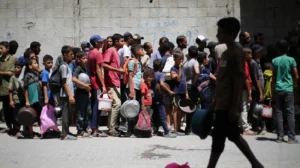We are starving

Palestinians queue for a portion of hot food distributed by a charity kitchen in the Nuseirat refugee camp in central Gaza on 15 July 2025
Ruwaida Amer writes in +972 on 21 July 2025:
I am so hungry.
I’ve never meant those words in the way I do now. They carry a kind of humiliation that I can’t fully describe. Every moment, I find myself wishing: If only this were just a nightmare. If only I could wake up and it would all be over.
Since last May, after I was forced to flee my home and take shelter with relatives in Khan Younis refugee camp, I’ve heard those same words uttered by countless people around me. Hunger here feels like an assault on our dignity, a cruel contradiction in a world that prides itself on progress and innovation.
Every morning, we wake up thinking only of one thing: how to find something to eat. My thoughts go immediately to our sick mother, who had spinal surgery two weeks ago and now needs nutrition to recover. We have nothing to offer her.
Then there’s my little niece and nephew — Rital, 6, and Adam, 4 — who ask for bread all the time. And we adults try to withstand our own hunger just to save whatever scraps we can for the kids and the elderly.
Since Israel imposed a total blockade on Gaza in early March (which it eased only marginally in late May), we haven’t tasted meat, eggs, or fish. In fact, we’ve gone without nearly 80 percent of the food we used to eat. Our bodies are breaking down. We feel constantly weak, unfocused, and off-balance. We grow irritable easily, but most of the time we just stay silent. Talking uses up too much energy.
We try to buy anything available from the markets, but the prices are becoming impossible. A kilo, or two pounds, of tomatoes now costs NIS 90 (over $25). Cucumbers are NIS 70 a kilo (around $20). A kilo of flour is NIS 150 ($45). These numbers feel outrageous and cruel.
We survive on only one meal a day: usually just bread, made using whatever flour we managed to find. If we’re lucky, lunch may include some rice, but even that doesn’t fill us up. We try to set aside a little food for my mother, maybe some vegetables, but it’s never enough. Most days, she’s too weak to stand, too drained to even perform her prayers.
We rarely leave the house anymore, afraid our legs might give out. It already happened to my sister: while searching on the streets for something, anything, to feed her children, she suddenly collapsed to the ground. Her body didn’t even have the strength to stay upright.
We began to sense the depth of the hunger crisis when the baker Abu Hussein, known to everyone in the camp, began scaling down his operations. He used to bake for dozens of families a day, including ours, who no longer have cooking gas or electricity to bake for themselves. From morning til night, his wood-burning ovens kept running. But recently, he was forced to start working fewer and fewer days each week. My sister would come home and say, “Abu Hussein’s is closed. Maybe he’ll work tomorrow.” Now, trying to get dough and flour has become its own kind of suffering.
